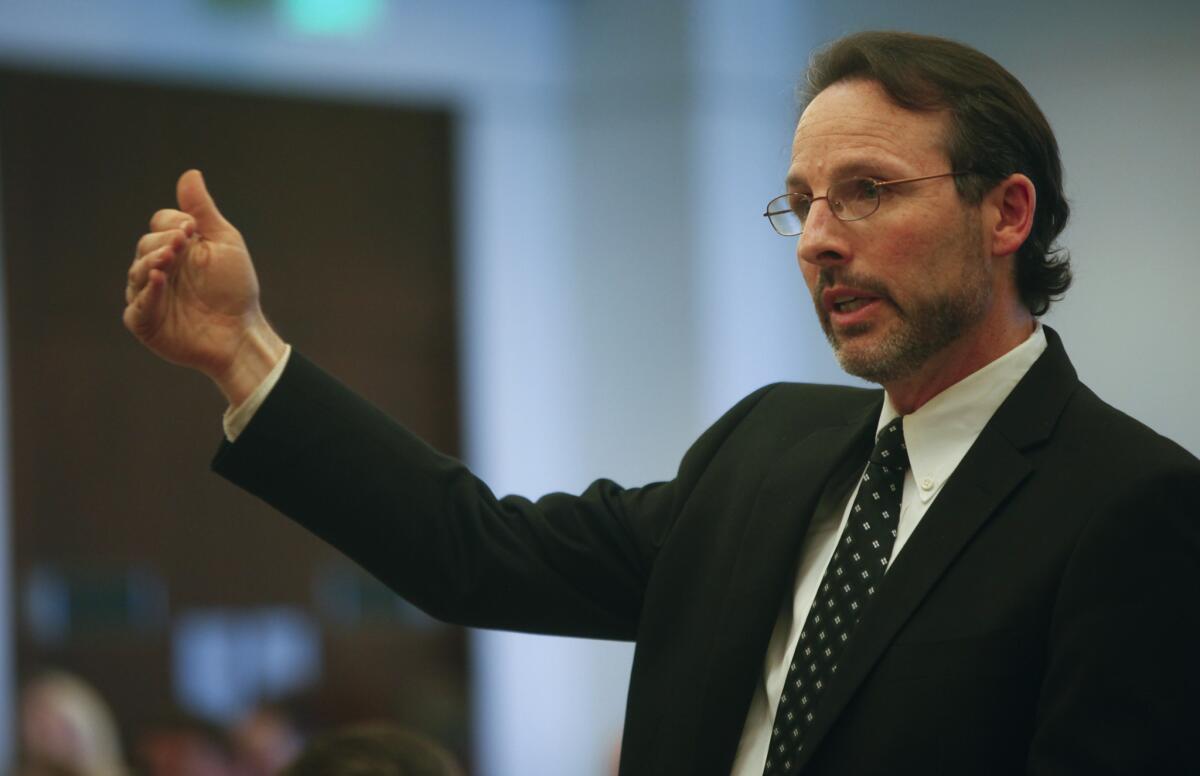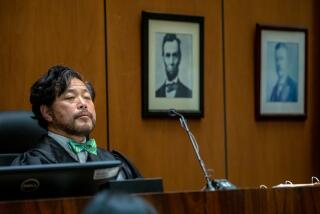Stakes rise in jailhouse informant case as judge blasts O.C. sheriff

Nearly four years ago, an Orange County trial judge presiding over a mass-shooter case gave an order that seemed straightforward enough. He told the Sheriff’s Department to turn over information regarding its use of a jailhouse informant who had implicated the defendant.
As a consequence of that order — and the botched, contradictory responses to it — the case of murderer Scott Dekraai has mushroomed into a far-reaching controversy regarding the use of cell-block informants, and how far authorities might go to conceal it.
The stakes mounted Thursday, with the U.S. Justice Department launching an investigation into whether the Orange County district attorney’s office has violated defendants’ rights with the use of such informants.
And on Friday the stakes seemed to climb higher still, with the jurist it all started with — Superior Court Judge Thomas Goethals — so vexed by the Sheriff’s Department’s behavior that he threatened to drag the sheriff into a contempt hearing.
“I’ve been waiting 200 weeks, 1,400 days,” Goethals said of the Sheriff’s Department’s failure to turn over relevant documents. “This case should have been resolved long ago.”
At a hearing in the Dekraai case, Goethals said he had reviewed about 1,000 pages of some 5,600 pages of documents that the Sheriff’s Department had recently given him in response to his discovery orders.
Goethals was displeased that some of the pages had been almost entirely redacted. “Redaction falls within this court’s job description and nobody else’s, frankly,” Goethals said. “That strikes me as inappropriate at best.”
He was also displeased with what he called a “pro forma” claim by county lawyers representing the Sheriff’s Department that the documents were privileged and therefore shouldn’t be released to the defense or the public.
Goethals wondered aloud if the county lawyers had bothered to read the documents themselves, since some were clearly not privileged. He told the lawyers to make specific privilege claims by mid-January, or they would be waived.
“This volume of material walks and talks and looks and smells like a classic discovery document dump,” Goethals said, referring to the legal practice of swamping litigants with time-consuming avalanches of material. “This smells like it, folks.”
Goethals said that Orange County Sheriff Sandra Hutchens had taken “inconsistent positions” on why certain documents shouldn’t be released.
The judge noted that a sergeant with the Orange County Sheriff’s Department made a sworn declaration in the summer of 2014 that “there is no jail informant program,” a claim contradicted by troves of documents that later emerged.
Goethals seemed to grow angriest, however, when he referred to a recent declaration by William Baker, a sheriff’s commander who has participated in the search for information in the so-called “Special Handling” log regarding jailhouse informants.
In the declaration, Baker said that a lieutenant and a sergeant in the Special Handling unit had refused to clarify what they called “inaccurate” accounts of their interviews about the log, and that two other deputies — William Grover and Ben Garcia — “declined to answer any questions about the Log.”
Goethals looked up from the document and noted that the sheriff was still allowing Grover and Garcia to carry badges.
“What is going on over there?” the judge shouted in the direction of two county lawyers who sat quietly in the jury box.
The last thing a judge wants to do is to hold a contempt hearing involving an elected official, Goethals continued. But “we are getting closer and closer to such a hearing,” he said.
D. Kevin Dunn, one of the county attorneys, said the Sheriff’s Department was diligently seeking information but had run into the “roadblock” that some deputies were facing criminal or departmental investigations.
“The effort continues,” Dunn said, adding that for as long as he’d been on the case, the sheriff had shown “absolute diligence” in responding to discovery requests.
The judge wanted to know how long Dunn had been on the case.
The answer was about a month.
The case of Dekraai — who has pleaded guilty to the murder of his ex-wife and seven others at a Seal Beach salon in 2011 — has no end in sight. He is awaiting the penalty phase of his trial, which will determine whether he receives life in prison or goes to death row.
Seeking to spare him from the death penalty, his lawyer, Asst. Public Defender Scott Sanders, has argued repeatedly that Orange County authorities have systematically flouted inmates’ rights for years.
Goethals threw the office of Orange County Dist. Atty. Tony Rackauckas off the case last year, and an appeals court recently denied the California attorney general’s appeal of that ruling.
The long wait for a resolution has been excruciating for the victims’ families, some of whom have called for authorities to drop the call for the death penalty. Prosecutors have recently expressed frustration with the sheriff’s laggard response to discovery orders, but critics say the district attorney’s office should have done so years ago, and more forcefully.
Defense attorney Brian Gurwitz, a former prosecutor who has followed the jailhouse informant case, said that Rackauckas had made the “fatal error” of failing to express outrage when jailhouse informant records — called TREDs — came to light more than two years ago.
“If Rackauckas had expressed even a fraction of the indignation that Scott Sanders expressed when the TRED records came out, his office never would have been recused,” Gurwitz said. “It would have been the smart thing to do ethically, politically and legally.”
The Sheriff’s Department says it has reformed record-keeping protocols and improved training on turning over relevant courtroom evidence.
Twitter: @LATchrisgoffard
ALSO
Police killing of unarmed, 73-year-old grandfather sparks anger, anguish
Robert Durst’s lawyers challenge evidence and accuse prosecutor of ‘deceptive’ jailhouse interview
More to Read
Sign up for Essential California
The most important California stories and recommendations in your inbox every morning.
You may occasionally receive promotional content from the Los Angeles Times.











